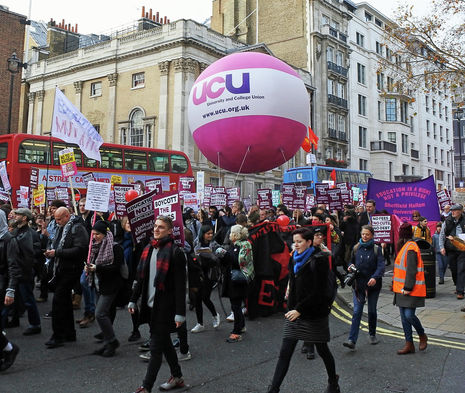Strikers and the UCU are missing the bigger picture
As the rising costs of higher education threaten Britain’s tuition cap, students will discover that solidarity is more expensive than they had bargained for.

Last month, the UCU – the trade union representing lecturers and other academics, and which is responsible for recent industrial action in Cambridge and other universities – announced that strikes for the next two weeks were being called off. They were going into intensive negotiations with employers, they said, and wanted the environment to be as positive as possible.
The mood music seems to indicate that a deal to end five years of strike-related disruption might be coming. That is good news for current students – but could spell trouble for our successors, and for universities which, unlike Oxford and Cambridge, cannot rely on multi-billion pound endowments to subsidise the money they lose educating students.
Strikes are about more than just pay. Working conditions and complicated pension changes all play a role. But it is pay I want to focus on, because it is pay, and the UCU’s demands for more of it, which illustrates a growing problem in our higher education system, and how if we don’t rethink things radically, they are only going to get worse.
If striking lecturers think they are owed a pay rise, their employers have had it far worse. If tuition fees had kept pace with inflation since 2010 then they would currently be £12,726.24. In fact, as we all know, they are £9,250 (a moment of silence here for the international students who are not protected by the government’s fee cap).
At Cambridge, Home and EU tuition fees accounted for just under 7% of the University’s income in the year ending 31st July 2022. According to The Financial Times, at Oxford these students’ fees cover less than half of what the University spends on them; as Louise Richardson, the Other Place’s now former vice-chancellor, told that paper: “We lose money on every student we admit”.
“British universities are reliant on international students’ uncapped fees to stay afloat”
At Oxford and Cambridge, large endowments and profitable side-hustles like Cambridge University Press help to plug that gap. But most universities don’t have those advantages. Last year, Parliament’s Public Accounts Committee sounded the alarm over this, describing “a background of deteriorating financial health of an increasing number of [universities]”. The fee cap was labelled a “systemic, long term pressure” on universities’ finances.
As a result of this pressure, British universities are reliant on international students’ uncapped fees to stay afloat. As the Public Accounts Committee put it: “Many providers are already highly dependent on cross-subsidy to make up deficits in publicly funded teaching and research. Much of this subsidy comes from income from overseas students’ fees”.
Becoming dependent on a relatively small fraction of their student body for income makes universities more sensitive to fluctuations in student numbers within that group. Though the British university sector weathered Covid relatively well – financially speaking – the pandemic showed the risks involved in a system whose sustainability is based on an assumption that ever more international students can be recruited to plug funding gaps.
Even without another pandemic, however, being financially dependent on international students is risky. It forces universities to engage in a fiercely competitive global market as they seek to attract the students without whom they cannot survive. If a university starts to lose its appeal to American, Chinese, or Indian students, for whatever reason, its future will become uncertain.
This is not necessarily a bad thing. Home students get their fees subsidised, and while international students face eye-watering fees, the fact that they continue to pay them suggests that they are happy with the service they are getting, especially since they have literally an entire world of other options to choose from. Universities grumble, but that might be a good sign too – the need to compete for international students forces them to keep standards high and reputations burnished, safeguarding universities from the dangers of public sector malaise and complacency.
But it does mean that, special cases like Oxford and Cambridge notwithstanding, demanding that universities fork out obscene amounts of cash to lecturers simply doesn’t make sense. The UCU is demanding a pay increase of 12% or RPI+2%, whichever is higher. This is utterly obscene, and while I am sure they expect to be negotiated down, there is a risk that the sum that is ultimately agreed upon ends up pushing some universities over the edge.
If the UCU is able to press universities, desperate to put an end to strike disruption, to pay more than they can afford, I am sure they will celebrate wildly in the short term. But if their members find themselves jobless in a few years time, as squeezed institutions cut courses, or even go under, they won’t be laughing. If the government decides that it needs to pre-empt this outcome by finally raising the tuition fee cap, the students who have stood shoulder to shoulder with their lecturers on picket lines through rain and shine may discover that solidarity is rather more expensive than they had bargained for.
 News / University Council rescinds University Centre membership20 February 2026
News / University Council rescinds University Centre membership20 February 2026 News / Hundreds of Cambridge academics demand vote on fate of vet course20 February 2026
News / Hundreds of Cambridge academics demand vote on fate of vet course20 February 2026 News / Judge Business School advisor resigns over Epstein and Andrew links18 February 2026
News / Judge Business School advisor resigns over Epstein and Andrew links18 February 2026 News / Caius students fail to pass Pride flag proposal20 February 2026
News / Caius students fail to pass Pride flag proposal20 February 2026 News / Union cancels event with Sri Lankan politician after Tamil societies express ‘profound outrage’20 February 2026
News / Union cancels event with Sri Lankan politician after Tamil societies express ‘profound outrage’20 February 2026










